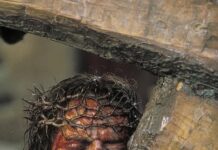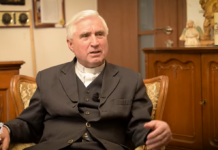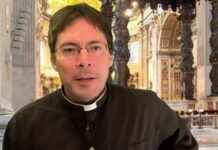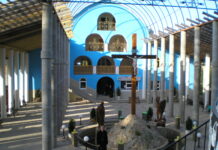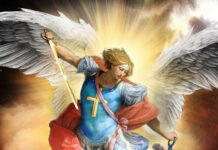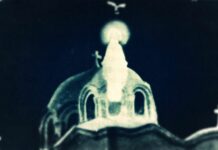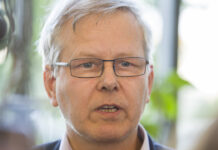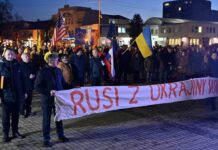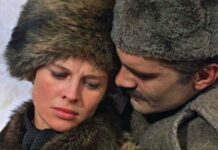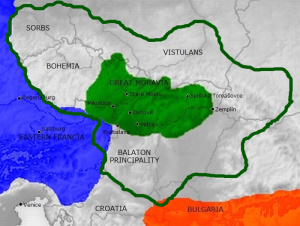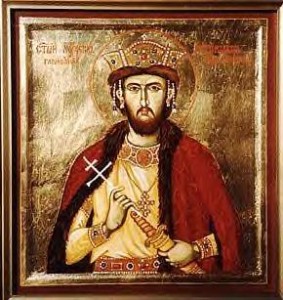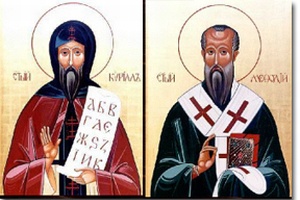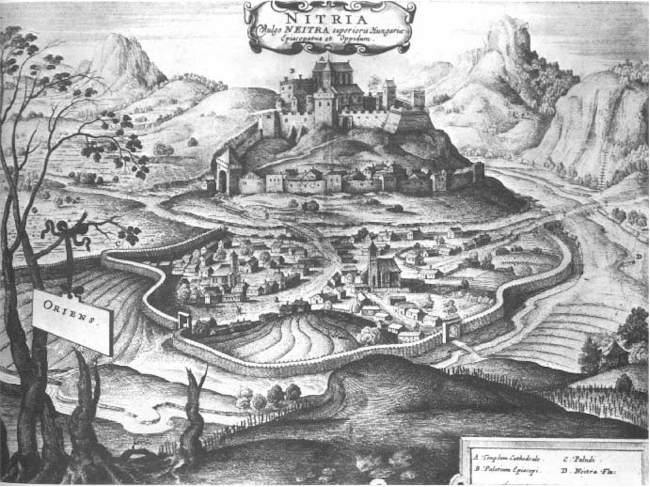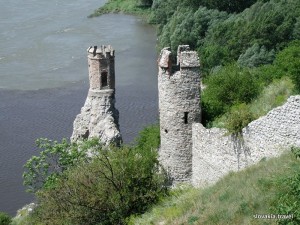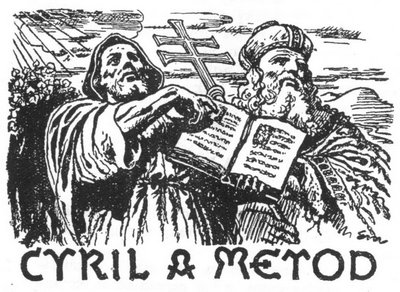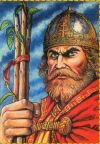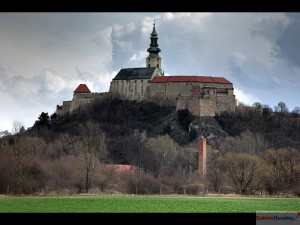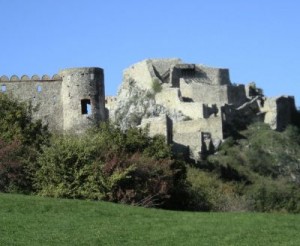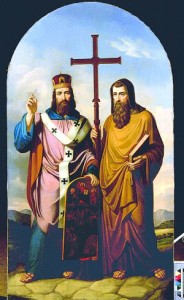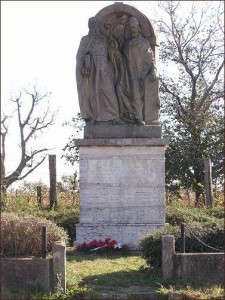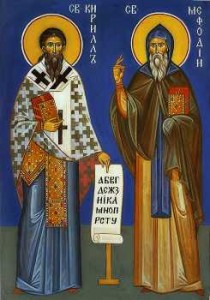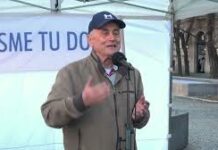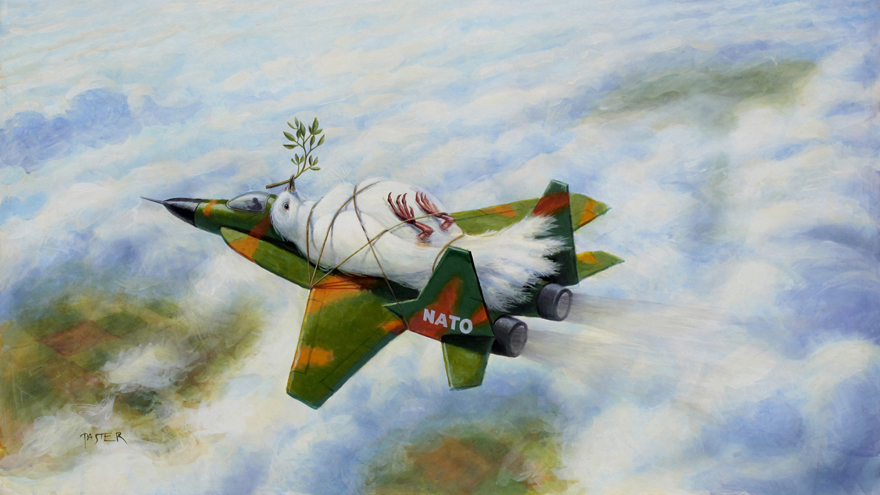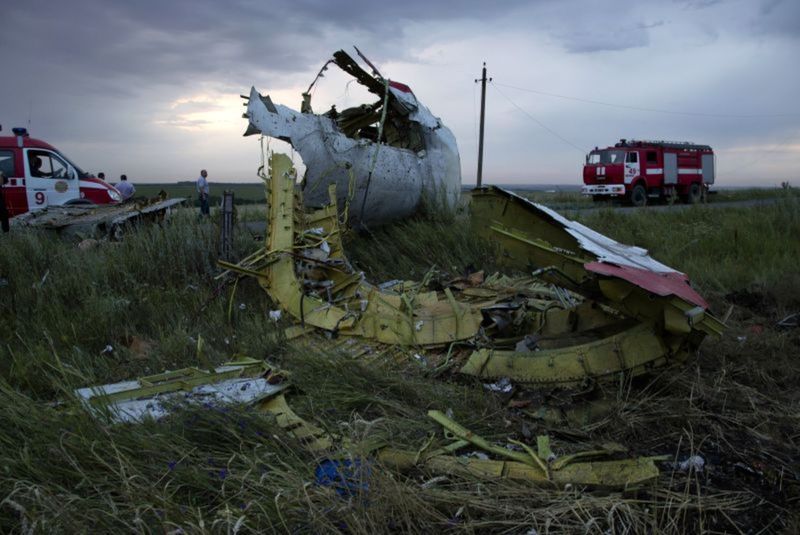Dňa 5. júla slávime sviatok sv. Cyrila a Metoda. Pripomienka cyrilometodskej tradície je súčasťou Ústavy Slovenskej republiky. Chráňme si ju a nedovoľme, aby bola z Ústavy vyňatá! Za dva roky budeme sláviť okrúhle 1150-te výročie príchodu svätých vierozvestcov na naše územie. Priblížme si teda niektoré udalosti z konca 9. storočia po Kristu na území Veľkej Moravy.
„…Lebo po mojej smrti prídu medzi vás draví vlci, ktorí neušetria stádo, aby strhli národ za sebou. Postavte sa proti ním, vy pevní vo viere! Toto vám sv. Pavol skrze mňa ukladá.“ Sv. Metod
Začiatkom 9. storočia vznikla na dnešnom západnom Slovensku a juhovýchodnej Morave dŕžava našich predkov, ktorú pomenovali podľa rieky Moravy. Keď k nej boli neskôr pripojené aj ďalšie územia, dostala meno Veľká Morava alebo Veľkomoravská ríša.
Na území tvoriacom jadro tejto ríše, sa začalo šíriť kresťanstvo už okolo roku 800. Prvými misionármi boli írsko-škótski mnísi a tiež nemeckí kňazi. Knieža Pribina vo svojom sídle v Nitre dal postaviť doteraz prvý známy kostol na Slovensku, ktorý roku 828 posvätil salzburský arcibiskup Adalrám na počesť sv. Emeráma.
Prosba kniežaťa Rastislava
Naši ľudia však nerozumeli cudziemu jazyku, a ešte väčšou prekážkou boli pre zlé vzťahy medzi Nemeckou ríšou a Moravským kniežatstvom. Preto sa vtedajší knieža Rastislav rozhodol získať misionárov, ktorí by hovorili ľudu zrozumiteľným jazykom. Okolo roku 861 sa najprv obrátil k pápežovi do Ríma, a keďže Rím nevyhovel, v roku 862 sa obrátil do Carihradu k byzantskému cisárovi Michalovi III. Ten určil pre túto misiu dvoch bratov: Konštantína a Metoda.
Konštantín a Metod pochádzali z mesta Thessaloniky (Solún). Hoci mesto bolo grécke, na okolí vtedy žili Slovania, a tak sa aj títo dvaja bratia naučili tamojší starosloviensky jazyk. Ich otec, menom Lev, bol vysoký vojenský dôstojník. Ich matka sa volala Mária. Spolu mali sedem detí, medzi nimi Metoda (815), a Konštantína – bol najmladší (827).
Metod mal vyvinutý zmysel pre praktické veci, študoval právo a stal sa náčelníkom jednej župy, kde bolo slovanské obyvateľstvo. V tom úrade prežil 10 rokov. Konštantín mal mimoriadne nadanie na filozofiu a iné humanistické
náuky. Po otcovej smrti ho vysoký cisársky úradník Theoktistos povolal do Carihradu, aby tam na cisárskej škole študoval spolu s budúcim cisárom Michalom III. V učení tak vynikal, že mu dali prímenie „filozof“.
Neskôr obidvaja bratia sa dali na duchovnú dráhu a boli vysielaní ako misionári. Prv než sa obaja bratia vydali na cestu na Veľkú Moravu, Konštantín zostavil slovienske písmo, hlaholiku, a začal prekladať do staroslovienskej reči najpotrebnejšie sväté knihy, začínajúc evanjeliom sv. Jána: „Na počiatku bolo Slovo a Slovo bolo u Boha a Bohom bolo Slovo.“ Toto sú prvé slová napísané v staroslovienskej reči. Tak sa začali kresťanské a kultúrne dejiny nášho národa.
Misia Solúnskych bratov
V roku 863 teda prišli Konštantín a Metod so svojou družinou na Veľkú Moravu k našim predkom. Koncom roku 866 alebo začiatkom roku 867 sa vydali na cestu. Knieža Rastislav ich privítal s veľkou radosťou. Svojím úmyslom mať vlastnú cirkevnú hierarchiu a zaviesť staroslovenčinu do bohoslužby chcel posilniť svoju dŕžavu nielen politicky, ale predovšetkým duchovne, so zámerom šíriť kresťanstvo do ostatných slovanských krajín.
Po príchode sv. Cyrila a Metoda na Devín v roku 864, dal Rastislav vo svojom sídle postaviť súkromný kostol, ktorý Konštantín a Metod zasvätili Najsvätejšej Trojici. Pri tomto kostole zriadili prvú vysokú školu v staroslovenskom jazyku na výchovu domáceho kňazstva a inteligencie. Ale hlavný katedrálny chrám, zasvätený Bohorodičke, bol v samostatnom meste, ktorého názov bol odvodený od Bohorodice Devy – DEVINgrad, pretože tu bolo významné pútnické miesto Panny Márie.
Po 40. mesiacoch účinkovania na Morave šiel Konštantín a Metod v roku 867 do Ríma získať oficiálne schválenie nového liturgického jazyka a vysvätiť svojich učeníkov. Rímskym pápežom bol vtedy Hadrián II. Keď sa dozvedel, že svätí bratia nesú so sebou pozostatky sv. Klementa, vyšiel im v ústrety osobne v slávnostnej procesii. Pozostatky uložili v bazilike, zasvätenej sv. Klementovi, a tam sa nachádzajú dodnes.
Smrť Konštantína – Cyrila
V Ríme mali svätí bratia vybaviť predovšetkým tri záležitosti:
1. potvrdenie staroslovienskej reči v liturgii západného, čiže rímskeho obradu;
2. vysviacku učeníkov na diakonov a kňazov (lebo ich nechceli dať vysvätiť nemeckým biskupom);
3. zriadenie samostatnej hierarchie pre Veľkú Moravu, ktorá by bola závislá priamo od pápeža.
Pápež vybavil kladne všetky tri žiadosti. Bolo to pravdepodobne na Vianoce roku 867, keď pápež v bazilike Santa Maria Maggiore pri jasličkách položil staroslovienske evanjelium na oltár a Konštantín hneď slúžil starosloviensku bohoslužbu. O krátky čas boli slovienski učeníci vysvätení za diakonov a kňazov. Otázka samostatnej hierarchie bola veľmi chúlostivá, lebo na to územie si nárokovali právo nemeckí biskupi.
Kým sa tieto veci vybavovali, Konštantín v Ríme ochorel. Cítiac blížiacusa smrť, prijal vyšší stupeň mníšskeho stavu, a zároveň aj meno Cyril. Zomrel v Ríme 14. februára 869. Pochovali ho v bazilike sv. Klementa.
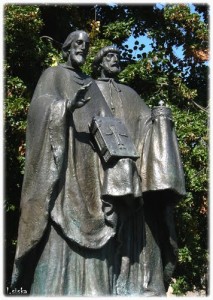 Po jeho smrti neostávalo nič iné, ako ustanoviť sv. Metoda za arcibiskupa pre novozriadenú veľkomoravskú cirkevnú provinciu. A skutočne ho vysvätil pápež Hadrián II. Keď odchádzal, pápež mu dal list adresovaný veľkomoravským kniežatám Rastislavovi, Svätoplukovi a Koceľovi. V ňom oznamuje, že im posiela Metoda ako arcibiskupa a pápežského legáta aj pre ostatné slovanské národy, že potvrdil starosloviensku reč v bohoslužbe a hrozí cirkevnými trestami tým, čo by sa opovážili protiviť týmto rozhodnutiam.
Po jeho smrti neostávalo nič iné, ako ustanoviť sv. Metoda za arcibiskupa pre novozriadenú veľkomoravskú cirkevnú provinciu. A skutočne ho vysvätil pápež Hadrián II. Keď odchádzal, pápež mu dal list adresovaný veľkomoravským kniežatám Rastislavovi, Svätoplukovi a Koceľovi. V ňom oznamuje, že im posiela Metoda ako arcibiskupa a pápežského legáta aj pre ostatné slovanské národy, že potvrdil starosloviensku reč v bohoslužbe a hrozí cirkevnými trestami tým, čo by sa opovážili protiviť týmto rozhodnutiam.
Útok na arcibiskupa Metoda
Medzitým sa na Morave v roku 870 dostal k moci Svätopluk, synovec kniežaťa Rastislava.
Napriek tomu, že mal veľkú zásluhu na rozkvete Veľkomoravskej ríše, duchovne ohľadne misie sv. Cyrila a Metoda, ako aj prínosu kultúrneho vzostupu Slovákov úplne zlyhal. V tom čase bavorskí biskupi za pomoci Karolmana zajali sv. Metoda, vracajúceho sa z Ríma už ako arcibiskupa a pápežského legáta a uväznili ho v niektorom z bavorských kláštorov. Keď sa v roku 873 vrátil zo zajatia do Devingradu – svojho arcibiskupského sídla, začal duchovný boj medzi stúpencami staroslovenskej liturgie a franskými kňazmi podporovanými Svätoplukom, ktorý sa stal odporcom cyrilometodskej misie.
Metod sa síce vrátil na Veľkú Moravu, ale mal veľké ťažkosti. Napriek tomu tu účinkoval až do smrti, ba začal šíriť kresťanstvo aj u Čechov a u Poliakov. V posledných rokoch života ešte pokračoval v prekladoch Sv. písma a bohoslužobných kníh. Zomrel 6. apríla 885. Pochovali ho slávnostne „v hlavnom moravskom chráme“ z ľavej strany oltára presvätej Bohorodičky Márie“. Dodnes nevieme, kde sa spomínaný chrám nachádzal.
Až po vyhnaní učeníkov z Veľkej Moravy, vyjadrili pisatelia Žitia Klimentovho pravú charakteristiku Svätopluka: „Tak oni aj Svätopluka, človeka hrubého a vznešeným veciam neprístupného, obišli klamom a celkom ho privábili na svoje učenie. A on, ktorý bol otrokom ženských rozkoší, skôr sa poddal tým, ktorí mu otvárali všetky dvere k náruživostiam, ako Metodovi, ktorý hanobil duchamornú horkosť každej rozkoše… (Metod) mu aj hrozil tým, že ak sa pripojí ku kacírom, zahubí aj seba aj svojich poddaných, stanúc sa ľahko premožiteľným od nepriateľov…“
Zrada kniežaťa Svätopluka
Skazu však Svätopluk dovŕšil, keď navrhol pápežovi nemeckého kňaza Wichinga za biskupa do Nitry, pretože Wiching rozpútal boj, v ktorom sa neštítil použiť akékoľvek prostriedky na získanie moci a zákaz staroslovenskej liturgie. Tým, Svätopluk zničil Rastislavov úmysel mať vlastnú hierarchiu. Vyhnaním cyrilometodských učeníkov zničil epochálne dielo svätých bratov, ktorí s Božím Slovom a prvým slovanským písmom prinášali I požehnanie svojbytnej kultúry. Zapredal tak svoj národ, ba i ďalšie pokolenia.
Pre bohatstvo a moc vložil Svätopluk svoje ruky do okov mágie, dal sa osedlať zlým duchom, skrze smilnicu, ktorá vládla čarami a priviedol na Devingrad, srdce celej krajiny, prekliatie. Skoro po jeho smrti (894) nastal úplný zvrat a ríša bola zničená nájazdmi kočovníkov. Tomuto vonkajšiemu zániku však predchádzal duchovný rozvrat.
Zmienku o obrate Slovenov z kresťanstva na pohanstvo zaznamenali i bavorskí biskupi v liste pápežovi Jánovi IX. V roku 900. Svätopluk zničil všetky stopy po kresťanstve i mariánskej úcte v Devingrade. Návratom k modlárstvu priviedol prekliatie nielen na seba, ale aj na celý národ, ako mu to predpovedal arcibiskup sv. Metod.
Tak slovenský národ, hneď po svojom „východe z Egypta“ zakúsil osud Izraela, na ktorom sa vyplnilo Božie Slovo (Dt 28, 1-50): „Pán si ťa postaví za svätý ľud, ako ti prisahal, ak zachováš prikázania Pána, svojho Boha,… ak nepôjdeš za cudzími bohmi, ani ich nebudeš uctievať. Ale ak nebudeš počúvať hlas Pána, svojho Boha, aby si zachovával a uskutočňoval všetky jeho príkazy … doľahnú na teba tieto kliatby… Pán dovedie na teba cudzí národ zďaleka, z končín, zeme, ktorý priletí ako orol. Národ, ktorého reči neporozumieš, národ ukrutný…“
Prekliatie za pohanstvo
Tým sa naplnilo proroctvo sv. Metoda o zániku Veľkej Moravy, zachytené v životopise jedného z cyrilometodských učeníkov sv. Nauma: „… a Moravská zem, ako predpovedal sv. Metod arcibiskup, za bezzákonia, pre diela ich i herézy a za vyhnanie pravoverných otcov a za strasti, ktoré prijali od heretikov, ktorým oni verili, čoskoro pomstu prijala od Boha. Nie po mnohých rokoch prišli Uhri, a zostala zem ich pustá Uhrom v moc…“
Po jedinečnej byzantskej misii, ktorá priniesla zvesť o duchovnom vyvolení Slovenského a položila základy všestrannej kultúry, sa znova začali pohanské modloslužby. Na mieste, kde sv. Cyril, arcibiskup Metod i jeho nástupca sv. Gorazd slúžili staroslovenskú liturgiu k jedinému a pravému Bohu, sa objavila hlava tura (býka). Toto sväté miesto zasvätené Najsvätejšej Trojici, kde sv. Cyril ako Mojžiš, priniesol pre slovenský ľud Bohom zjavené písmo – Hlaholiku, aby ním hlásal Božie Slovo, bolo ťažko znesvätené.
Svätopluk, ako hlava Slovenov sa tu opäť začal klaňať pohanskému božstvu. Tak sa mohol býk dostať najprv do kráľovskej pečate a neskôr aj do znaku Devína, kde zostal dodnes. No to je iba znamenie. Hlbšie dôsledky možno rozpoznať až dnes, po vyše tisíc rokoch, keď je možné vidieť, že charakter tohto prekliatia sa prejavuje najmä v oblasti kultúry – daru, ktorý sme neprijali. Tak sa aj na nás vyplnili slová Písma:
„Budú ťa ustavične haniť a utláčať…Vystavíš si dom, lež iný bude v ňom bývať. Vysadíš si vinicu a nebudeš ju oberať…Tvoji synovia a tvoje dcéry sa dostanú ako korisť cudziemu národu … Veľa semena zaseješ na poli, ale málo budeš žať… Cudzinec, čo bude s tebou v krajine, prevýši ťa a bude mocnejší ako ty, ty však budeš upadať a budeš mu podriadený.
Všetky tieto kliatby na teba doľahnú a dochytia ťa, ony budú znameniami na tebe a na tvojom potomstve… pretože si neslúžil Pánovi, svojmu Bohu, s radosťou a veselým srdcom za všetku jeho štedrosť.“ (Dt 28 kap.)
Proroctvo sv. Metoda
Sv. Kliment, žiak sv. Cyrila a metoda v 10 stočí popísal vo svojom diele podrobne situáciu Svätoplukovej zrady Boha,
„Svätopluka, ktorý po Rastislavovi panoval nad Moravou, človeka hrubého a kráse ducha nechápajúceho, Frankovia obišli klamom a celkom ho privábili na svoje učenie.
Plemeno Frankov, hrešiacim odpúšťali všetko, len aby súhlasili s ich učením, a dovoľovali nerestný život, len aby ich prekrútené učenie malo úspech. Tak Svätopluk pokazený týmito ľuďmi, veľmi málo si všímal Metodove slová, ba správal sa k nemu ako k nepriateľovi, lebo nábožnosť je hriešnikovi mrzkosťou (por. Sir. 1,26).
A pred svojou smrťou Metod zvolal svojich učeníkov a utešoval a posilňoval ich, predstavujúc im dedičstvo krásne a hodné námah, lúčiac sa slovami:
„Vy poznáte drahí moji, silu kacírov v konaní zla a ako sa oni všetkými spôsobmi, kaziac slovo Božie, snažia napájať blížnych mrzkým prekrúcaním Písma… posilňuje druhých, aby chránili záloh, ktorý sme dostali od apoštolov a aj od cirkevných členov, ktorý budú oni žiadať od nás v deň odplaty.
Hľa, predpovedal som vám to a touto predpoveďou som vás urobil zodpovednými za hriech, lebo keby som nebol prišiel, ako hovorí Ježiš, a nebol im hovoril, nemali by hriech. (Ján 15,22) Nepoškvrnený som od vašej krvi, lebo som nezanedbal zvestovať vám, ale podľa Ezechiela bol som bdelý, robiac dielo strážcu. Dajte si veľký pozor ako máte chodiť! Nie ako nemúdri, ale ako múdri. A so všetkou bdelosťou strežte srdcia svoje i bratov vašich, lebo uprostred osídiel budete chodiť a po štítoch mestských sa budete prechádzať. Lebo po mojej smrti prídu medzi vás draví vlci, ktorí neušetria stádo, aby strhli národ za sebou. Postavte sa proti ním, vy pevní vo viere! Toto vám sv. Pavol skrze mňa ukladá.“ Keď toto povedal a ešte mnohé iné, odovzdal dušu svoju…
Ovocie rozkolu
Prvé miesto nasledovníkmi Metoda zaujímal Gorazd. Ale priveľmi opovážlivý
zástup kacírov nezniesol to, aby bol Metod aj po smrti ich živým protivníkom a
povedali: „Poďme a potlačme Gorazda a zlapajme ho úkladom, pretože nám je nepodobný jeho život i vzdialené sú cesty jeho a vyčíta nám hriechy. A ak sa on nechá na žive, tak nám ožije Metod.“
A pozbavili Gorazda biskupskej moci. A nakoľko tento stolec vďaka Metodovi slávnym sa stal, a nad mnohé vynikal, natoľko pre Wichinga do priepasti biedy upadol. Gorazd a Kliment hovorili Svätoplukovi: „Knieža, dlhé reči by nám bolo treba hovoriť o tom, lebo nevystavuje sa nebezpečenstvu nepatrné dielo, ale cirkevná dogma, týkajúca sa Svätej Trojice i duše, čo je nám najmilšie zo všetkého. Ale pretože tvoja nevedomosť Písma nedovoľuje ti počúvať dlhšie a hlbšie reči… odpovieme jednoducho.“
Ale knieža sotva porozumelo niečo z toho mála, čo mu povedal Gorazd a Kliment, pretože bolo úplne tupé na pochopenie božských vecí, i preto, že bolo vychované skôr barbarským spôsobom, alebo lepšie povedané zversky, i preto, že ako sme povedali prv, zničilo svoj rozum nečistou rozkošou. Svätopluk poučený kacírmi, lebo im bol úplne oddaný, dal pravoverným takúto odpoveď:
„… Kto prvý pristúpi a odprisahá, že verí pravoverne, ten sa podľa môjho súdu neprehrešuje v ničom proti správnosti vo viere, tomu aj Cirkev odovzdám a poskytnem podľa spravodlivosti aj kňazstvo v Cirkvi.“
Varovné znamenia
Vtedy Frankovia,… nepočkajúc ani na skončenie kniežaťovho riešenia, odprisahali a trvali na svojom zlom učení, ukončiac tak nerozumný súd. Pri takýchto sudcoch sa kacírstvo ovenčilo víťazstvom nad pravovernosťou a dostalo úplnú moc utláčať a haniť pravých sluhov Krista a ochrancov viery.
Neľudsky ich mučili, niektorým rozkrádali príbytky, spájajúc ziskuchtivosť s
bezbožnosťou, iných nahých vláčili po tŕní a pritom ľudí starých, ba i takých, ktorí prekročili Dávidov vek. A ktorí z kňazov a diakonov boli mladší, tých predávali Židom, sami sú hodní Judášovho osudu a zahrdúsenia… A nebolo nijako málo, ale ako sme povedali prv, napočítalo sa ich 200 služobníkov oltára.
Ale Pán, ktorý potešuje úbohých, uzdravuje srdcom zlomených, potešuje dušu útechou primeranou úzkosti, potešil svätých, pošlúc im pomoc zo Svätyne.
Lebo oni, hoci obťažení železom okov, ani tak nenechali bez povšimnutia modlitby, ale spievali piesne tretej hodiny a potom zaspievali ešte príspev k žalmom, v ktorom
sa modlíme, aby presvätý Duch poslaný v tretiu hodinu apoštolom, obnovil sa v nás. A Boh, čo na zem pozerá, učinil, že sa ona triasla a nastalo veľké zemetrasenie, podobné tomu ako voľakedy, keď sa Pavol modlil v žalári a nastal akoby hukot z neba a okovy mu spadli (Skut. 16, 25-26), i oni, ktorí do týchto čias boli zatvorení v žalári stali sa slobodnými, súc nerozlučne spojení iba jedinou túžbou po Kristovi.
A tak Boh zatriasol zemou a uviedol ju v zmätok.
Zatriasli sa aj obyvatelia mesta a privedení boli v zmätok tým, čo sa stalo, takže sa
divili a nechápali, čo značí toto znamenie Božie. Ale keď sa priblížili k temnici a uvideli čo sa stalo so svätými, a ako títo po spadnutí okov boli úplne slobodní a recitovali Dávidov žalm s prosbou o radosť (Ž51,10) , bežali ku kniežaťu hovoriac „Skutočne neporozumieme zázraku, ktorý sa stal? Naozaj sa nezľakneme znamenia Božieho?“ Ale jazyk kacírov sa znova snaží ohovárať tento zázrak… A neobvyklosť tejto veci pripisovali moci Belzebuba, súc sami naplnení jeho mocou. Potom zasa svätých obchvátili okovy ťažšie ako prvé a mučenia v temnici ešte bezútešnejšie ako prv. Prešli tri dni a znova v čase dokončenia modlitby tretej hodiny stáva sa to isté ako prv – zemetrasenie spolu s hukotom z neba a spadnutie okov.
Vyhnanie Metodových učeníkov
A zasa títo protivníci Boha neohlásiac nič kniežaťu o tom, čo sa stalo, podrobili svätých tým istým mučeniam, ktorých oni sami podľa súdu pravdy plne boli hodní.
Jednako knieža súc otrocky oddané týmto kacírom nič o tom nevedelo, pretože v tom čase práve nebolo prítomné. A keby Svätopluk bol býval doma, tí by sa tak neprejavili voči vyznávačom pravdy, pretože hoci sa tisíc ráz nakláňal na stranu Frankov, ale nehľadiac na jeho polozverstvo a ukrutnosť, zdráhal sa pred čnosťou týchto svätých mužov, najmä keď Boh tri razy vykonal zázrak.
Po takýchto neľudských úderoch, nedajúc svätým ani len prijať pokrm – pretože kacíri nikomu nedovolili hodiť ani kúska chleba služobníkom Krista – oddali ich vojakom, aby títo odviedli každého na rôzne miesta pri Dunaji, odsúdiac nebeských
občanov na večné vyhnanie z mesta. Vojaci, ľudia suroví, lebo to boli Nemci majúci hrubosť od prírody, zväčšiac ju ešte aj podľa príkazu, vezmúc svätých, vyvádzajú ich z mesta a zoblečúc vliekli ich nahých. Ba aj meče im prikladali na šije, akoby ich zamýšľali zaklať, aj kopije im prikladali k bokom, akoby sa chystali ich prepichnúť. Aj toto vojakom prikázali nepriatelia. Vojaci ich viedli, a keď už boli ďaleko od mesta
nechali ich a vybrali sa nazad do mesta.
I rozišli sa každý inou stranou, podľa vôle Božej, aby viac krajín prijalo evanjelium.
* * *
Sv. Cyril a Metod patria medzi najväčších misionárov kresťanstva. Ich činnosť priamo alebo nepriamo zasiahla celú východnú Európu. A preto ich pápež Ján Pavol II. dňa 31. decembra 1980 vyhlásil vedno so sv. Benediktom za spolupatrónov Európy. Pripravil: (anse)
Použitá literauúra: R. Ondruš: Blízki Bohu i ľuďom, E. Šubjaková: Devingrad)
The heritage of our fathers: the 5th of July, the Feast of Cyril and Methodius
On the 5th of July we celebrate the Feast of the Saints Cyril and Methodius. The tradition of remembering Cyril and Methodius is a part of the Constitution of the Slovak Republic. Let us protect it and do not allow it to be excluded from our Constitution! In two years we will celebrate the 1150 anniversary of the arrival of these apostles in our area. Let us clarify some of the events of the late ninth century AD within what was then known as Great Moravia.
„… Because after my death some wild wolves shall come among you and they will not spare the flock to mislead the nation behind him. Stand up against him, be firm in your faith! This is a task given to you by St. Paul through me.“ St. Methodius.
At the beginning of the 9th century the current territories of western Slovakia and southern Moravia belonged to our ancestors. The Empire was named after the river Morava. In annexing other territories it was named Great Moravia or the Great Moravian Empire.
Christianity already began to spread here around 800 AD. The first missionaries were Celtic monks and also German priests. The first known church in Slovakia, which was consecrated in 828 in honour of St. Adalram by the archbishop of Salzburg, was built in Nitra – the seat of Prince Pribina.
Prince Rastislav´s request
Our people, however, did not understand foreign languages, and even greater obstacle was the poor relationship between the German Empire and the Moravian principality. This was the reason for Prince Rastislav’s decision to get the missionaries to speak an understandable language.
Around 861 he turned firstly to the Pope in Rome but his request was not satisfied. Then in the year 862 he turned to Constantinople to the Byzantine Emperor Michael III. He designated for this mission, two brothers: Constantine and Methodius.
Constantine and Methodius came from Thessaloniki.
The city was Greek but Slavs were living in the surrounding countryside and so the two brothers were taught old Slavic.
Their father, named Leo, was a senior military officer. Their mother was called Mary. They had seven children, Methodius and Constantine – the youngest child among them.
Methodius had a practical sense of things. He studied law and became a chief of a county with the Slavic population. He spent 10 years in this office. Constantine had a special talent for philosophy and other humanistic teachings.
After his father’s death he was summoned by a high official of the imperial Theoktistos to Constantinople to study together with the expectant Emperor Michael III. His excellent study results gave him the moniker „Philosopher“.
Later, both brothers stroke out on a spiritual path and were sent as missionaries to Moravia. Before the two brothers went on a trip to Great Moravia, Constantine established a Slavonic script, Glagolitic, and began to translate the necessary sacred books into the old Slavonic language. The first one was St. John´s Gospel: „In the beginning was the word, and the word was with God.“
These were the first words written in the old Slavonic language. So began the Christian and cultural history of our nation.
Thus, in 863, Constantine and Methodius arrived with their suite to our ancestors in Great Moravia. Rastislav´s intention was to create his own church hierarchy and to establish the old Slavonic language as the language of worship service. He wanted to strengthen his independence not only politically, but especially spiritually, in order to spread Christianity to other Slavic countries.
In 864, upon the arrival of the Saints Cyril and Methodius, Rastislav built a private church consecrated by them to the Holy Trinity at his residence. Soon after the first Slavonic college for education of the clergy and local intelligentsia was established.
But the main cathedral church, dedicated to the Mother of God, was situated in a separate city, whose name was derived from the Mother of God (Deva) and named DEVINgrad, because a significant shrine of the Virgin Mary was situated there.
In 867, 40 months after the action in Moravia, Constantine and Methodius went to Rome to obtain official approval for a new liturgical language and the ordination of their disciples. The Pope Hadrian II., learning that the holy brothers are carrying the remains of St. Clement, went out to meet them personally with a festive procession. The remains were deposited in the Basilica dedicated to St. Clement, and have resided until now.
The death of Constantinius – Cyril
The holy brethren have dealt with three issues in particular:
1. confirmation of the Slavonic language in the liturgy of the Western rite;
2. the ordination of priests and deacons (because they did not want to allow ordination by German bishops);
3. the establishment of a separate hierarchy for Great Moravia, which would be directly falling under the Pope.
The Pope recognized all three applications.
It was probably on Christmas Day in 867, when Pope laid the old Slavic Gospel on the altar and at the manger of the Basilica Santa Maria Maggiore and Constantinius immediately gave a Slavic Mass. A short time later, Slavonic disciples were ordained as deacons and priests. The question of the separate hierarchy was very delicate because the territorial rights were assumed by the German bishops. While these matters were negotiated, Constantine felt ill in Rome. Feeling his imminent death, he accepted a higher degree of monastic state and accepted his new name Cyril. He died in Rome on 14 February 869 and was buried in St. Clement.
After his death, St. Method was appointed archbishop of the newly established province of the Great Moravian Church. He was also ordained by Pope Hadrian II. Then he left Rome entrusted with a letter addressed to the Great Moravian Princes Rastislav, Svatopluk and Kocel. The letter contained information about Method´s designation as archbishop and the papal legate for other Slavic nations, the confirmation of Slavic as a liturgical language and a list of ecclesiastic penalties to those who dare to contest these decisions.
The attack on Archbishop Methodius
Meanwhile, in the year 870 Svatopluk, Rastislav’s nephew came to power in Moravia.
Despite Svatopluk´s great contribution to the welfare of the Moravian Empire, his activities in the cultural field as well as in the spiritual field, especially regarding to the mission of the Saints Cyril and Method, were completely devastating. Method, now archbishop and papal legate was captured and imprisoned on his way from Rome in one of the Bavarian monasteries by Bavarian bishops, with the assistance of Karolman.
Returning in 873 from this captivity to Devingrad – his archbishop’s residence, he began a spiritual battle between the supporters of Slavonic liturgy and Frankish priests supported by Svatopluk, who became opponents of the mission of Cyril and Methodius.
Since Methodius returned to Great Moravia, he had great difficulties. Despite this he acted there until his death, even began to spread Christianity to the Czechs and the Poles. In the last years of his life he continued in the translation of the Holy Scripture and liturgical books. He passed away on the 6th of April 885. He was solemnly buried „in the main Moravian church“ on the left side of the altar of the Virgin Mary.“ We still do not know where this temple was located.
Only after the expulsion of the disciples from Great Moravia, the writers expressed the true characteristics of Svatopluk in the „Life of Kliment“: „So they betrayed Svatopluk who was a barbarous man and also inaccessible to noble things, and they lured him through their teachings. And he, who was a slave of female pleasures preferred those who opened the door to all these passions to Methodius who decried the destructive bitterness of every pleasure … (Methodius) threatened him that should he continue to connect to heretics, he will kill himself and also his liege people who will become easy plunder for their enemies … “
Svatopluk´s betrayal
However Svatopluk completed his destruction sending by a suggestion to the Pope to install the German priest Wiching as the Bishop of Nitra. Wiching started a merciless fight to gain power and to ban the old Slavonic liturgy. Rastislav´s intention to have own hierarchy was destroyed.
The exile of Methodius´ disciples completely destroyed the epochal work of the holy brothers, who brought the blessing of an independent culture through God’s Word and the first Slavic script. So he sold his people and many generations to follow.
For wealth and power he placed his hands into magic shackles, he was saddled with evil spirits through the harlot, who ruled through magic and thus brought her to Devingrad. This way the whole heart of the country was cursed. Soon after his death a complete reversal came about and the Empire was destroyed by nomadic raiders. But this outer termination was foreborn by spiritual turmoil.
The reference to the turning away from the Slovene form Christianity was also noted by the Bavarian bishops in a letter to Pope John IX in 900 AD. All traces of Christianity and Marian devotion in Devingrad were removed. A revert to idolatry brought a curse not only onto Svatopluk but onto the whole nation.
Thus, the Slovak nation, immediately after his‘ departure from Egypt „experienced the fate of Israel, which is completed by the Word of God.(Deuteronomy 28, 1-50):
If you fully obey the LORD your God and carefully follow all his commands I give you today, the LORD your God will set you high above all the nations on earth. All these blessings will come on you and accompany you if you obey the LORD your God:
You will be blessed in the city and blessed in the country… However, if you do not obey the LORD your God and do not carefully follow all his commands and decrees I am giving you today, all these curses will come on you and overtake you: You will be cursed in the city and cursed in the country… The LORD will cause you to be defeated before your enemies….The LORD will bring a nation against you from far away, from the ends of the earth, like an eagle swooping down, a nation whose language you will not understand…
Curse for paganism
Thus, the prophecy of St. Method of Great Moravia, captured in the biography of one of the disciples of St. Cyril and Methodius – Naum was fulfilled:
„… And the Moravian land, as predicted St. Methodius- Archbishop soon received a revenge from God. This happened for injustice, for their bad works and heresies, for the expulsion of their orthodox fathers, and for the hardships they have taken from the heretics, whom they believed. Soon after came Ugrian and their land remained destroyed and in the Ugrian´s hands. … “
After the termination of the unique Byzantine mission that brought news of the spiritual elect of Slovaks and laid the foundations for a versatile culture, pagan idoltary began to spread across the land. A head of a bison (bull) appeared at the place where the Sts. Cyril and Archbishop Methodius and his successor St. Gorazd served the old Slavonic liturgy to the one true God. So this holy place consecrated to the Blessed Trinity, where St. Cyril like Moses brought to people Glagolitics – a script revealed to Slovaks by God and dedicated for preaching of God´s Word, was severely desecrated .
Svatopluk, as head of the Slovene, again began to worship pagan deities. Thus the bull could firstly become a constituent of the royal seal, and later of a sign of Devin, where has remained up until now.. But this is only the sign. Deeper implications can now be identified, after more than a thousand years, when the nature of this curse is visible especially in the field of culture – of a gift that we didn´t adopt. So the following words of the Scripture were fulfilled:
„You will be oppressed and robbed
You will build a house, but you will not live in it. You will plant a vineyard, but you will not even begin to enjoy its fruit.
Your sons and daughters will be given to another nation
You will sow much seed in the field but you will harvest little, .
The foreigners who reside among you will rise above you higher and higher, but you will sink lower and lower.
All these curses will come on you. They will pursue you and overtake you until you are destroyed, because you did not obey the LORD your God and observe the commands and decrees he gave you.
They will be a sign and a wonder to you and your descendants forever. Because you did not serve the LORD your God joyfully and gladly in the time of prosperity.“(Deuteronomy 28, 1-50):
Prophecy of St. Methodius
St. Clement, the Sts. Cyril and Methodius´ scholar, described Svatopluk’s betrayal of God in detail in his 10th century work: „Svatopluk, who ruled over Moravia after Rastislav, was rude and was unable to understand the beauty of the spirit. Franks completely deceived him and lured him through their teachings.
He forgave the sinning breed of Franks and accepted their teachings, and permitted the vicious life and thus their distorted teachings succeeded. So Svätopluk, spoiled by these people, barely noticed Methodius´ words and, indeed, behaved towards him as to an enemy, because piety is an abomination for a sinner.
And before his death, Methodius, gathered his disciples and strengthened them, showing them that their heritage was beautiful parting from them with the following words:
„My dear, you know the power of heretics in doing evil and also how they try to thwart their neighbours by twisting the Scriptures…You must strengthen others to protect the advances we received from the apostles and from other members who will ask them from us on the day of retribution.
Behold, I have foretold you this and thus, I have made you responsible for sin.
I am spotless from your blood, because I did not neglect to preach to you, but according to Ezekiel, I was awake, doing guard work. Be very careful how you walk! Not as unwise but as wise. And with all your alertness beware of your brothers because you will walk into the middle of traps and you will walk on shields of cities. Because after my death wild wolves will come among you and they will not spare the flock to misguide the nation behind them. Stand up against him, be firm in your faith! This is what St. Paul orders you through me. “ St.Methodius. Saying this and much else, he passed away …
Fruit of disruption
In first place among Methodius´ followers was Gorazd. But a too impudent crowd of heretics could not sustain among them the followers of Methodius and their own opponents after his death and said:
„Come and repress Gorazd, let us prepare a trap and nab him, because we are unlike his life as well as his roads are distant to us and he accuses us of our sins. And if he is alive, Methodius is alive.“
They deprived Gorazd of the power of being a Bishop. And since that holy office became famous though Methodius and excelled at it, and through Wiching it fell into the abyss of misery.
Gorazd and Clement said to Svatopluk: „Prince, a long speech would be necessary to talk about this matter because it is not a subtle work, it is exposed to a danger, but the religious dogma concerning the Trinity and the soul, which is our most precious of all.
You are not allowed to listen longer and deeper speech because of your ignorance of the Scriptures… we simply have the only answer.“
But the prince barely comprehended anything of what was briefly said by Gorazd and Clement. He was quite dull in the understanding of divine things, and this was because he was raised in a rather barbaric way, (or a rather bestial way), and because as it was said before, some of dirty pleasures destroyed his brain. Svatopluk, completely loyal to the heretics and instructed by them, gave them such an answer:
„… Who is approaching as the first and who is swearing that his belief is orthodox – he according to my point of view is not sinning against the correctness of the faith. I relegate the Church as well as the priesthood to him, according to law. “
Warning signs
Then the Franks… waiting not for the Prince s final solution…made an oath, insisted on their wrong teaching and ended this irrational court up. For such judges, a victory of heresy triumphed over the orthodoxy and received the full power to oppress and malign the servants of Christ and the true defenders of the faith.
They were tortured inhumanly, their houses were burgled – combining godlessness with profiteering – other, often old people and even those who have crossed the age of David, were naked and dragged into the thorn brush.
Younger priests and deacons were sold to the Jews. In doing so they were worthy of Judas‘ fate and a burkism. And they were not only few. As it was said before, it amounted to 200 servants of the altar.
But the Lord who comforts the poor, heals broken hearts, comforts the soul through consolation which is appropriate to its anxiety, comforted also saints, sending them help from the sanctuary. Because they, though laden with iron shackles, did not forget prayers, sang the songs of the third hour, and then sang even more contributions to the Psalms, in which we pray that the Holy Spirit sent by the third hour of the Apostles, is restored in us.
And God, who looks at earth, made that it was shaking and there was a great earthquake, similar to this, when Paul prayed in prison and there was a roar as if from heaven, and his chains fell off; so they who in those times were closed in the prison became free, being indissolubly united only in one longing for Christ.
So God shook the earth and brought it into confusion.
The city and the people in it were shaken too and thus they were confused. They were astonished by what had happened and did not understand that this means a sign from God.
But then they approached the prison and saw what happened to the saints who, after shackles had fallen off, were completely free, recitated a psalm of David which is a request for joy. They ran to the Prince, saying: „Really do not we understand the miracle that has happened? Truly are we not afraid of a sign of God “ But the language of the heretics again tried to slander the miracle …
and an untowardness of this matter, being filled with his power, attributed to Belzebub. Then the new shackles and even heavier torture than the first one waited for them. After three days, at the time of concluding prayers the same happened again– an earthquake together with a roar from the sky and the shackles fell off.
The expulsion of Methodius´ disciples
And again, these enemies of God did not inform the prince about what happened and the saints were forced to undergo the same torture by those who were equally fully worthy of it.
However, the prince being slavishly devoted to these heretics did not know anything about it because he just was not present at that time.
And if Svatopluk had been present, they would have not treated the confessors, in this manner, because despite of his inclination to the Franks, despite of his half-barbarity and cruelty, he held the virtues of the holy men in regard, especially when God’s miracle occurred three times.
After such inhuman strokes, allowing the saints not even to take food – because the heretics did not allow anyone to throw a piece of bread to the servants of Christ – they ordered the soldiers to lead the saints to a different place near Danube and condemned the heavenly citizens into perpetual exile from the city.
The soldiers were brutal people, having a roughness in nature because of their German origin. This was strengthened according to the order they received. They took the saints, undressed them and dragged them naked out of the city. They even attached swords to their necks, as if they intended to kill them and attached lances to their hips, as if about to pierce them. This the soldiers were ordered to do by the enemies. The soldiers led them, and when they were far from the city, they left them alone and went back to the city.
The saints then dispersed in various directions, according to God´s will to preach his Word to other nations.
Cyril and Methodius rank among the greatest missionaries of Christianity. Their activities influenced directly or indirectly the whole of Eastern Europe.On 31-st of December 1980 Pope John Paul II declared them co-patron saints of Europe together with St. Benedict.



